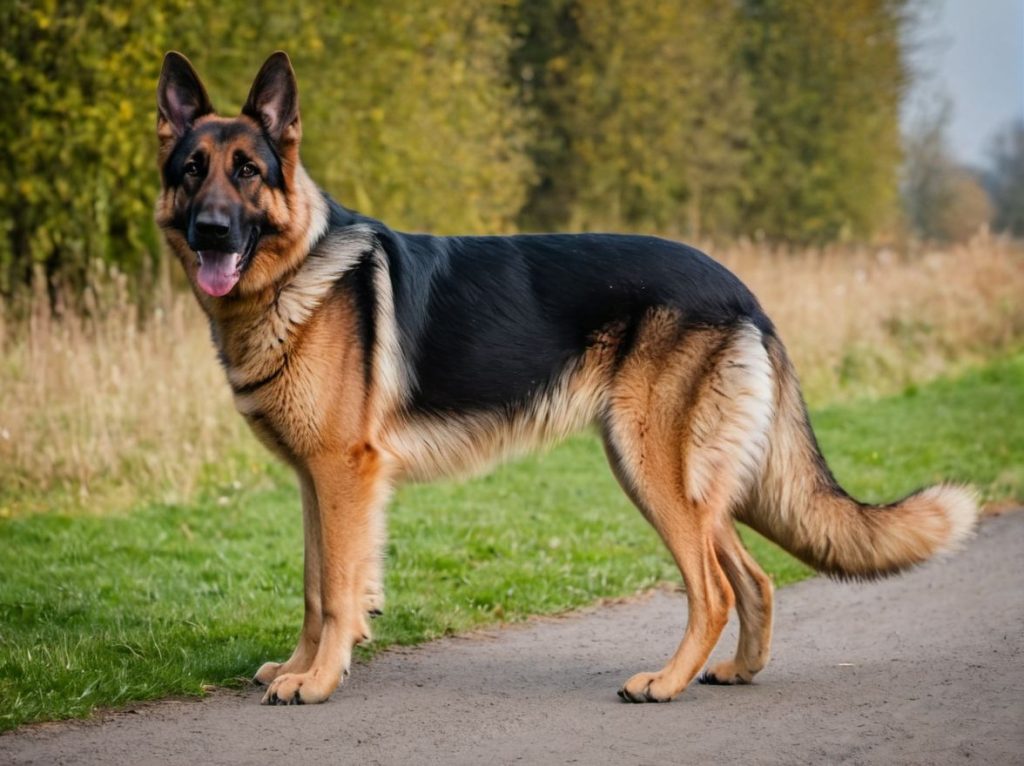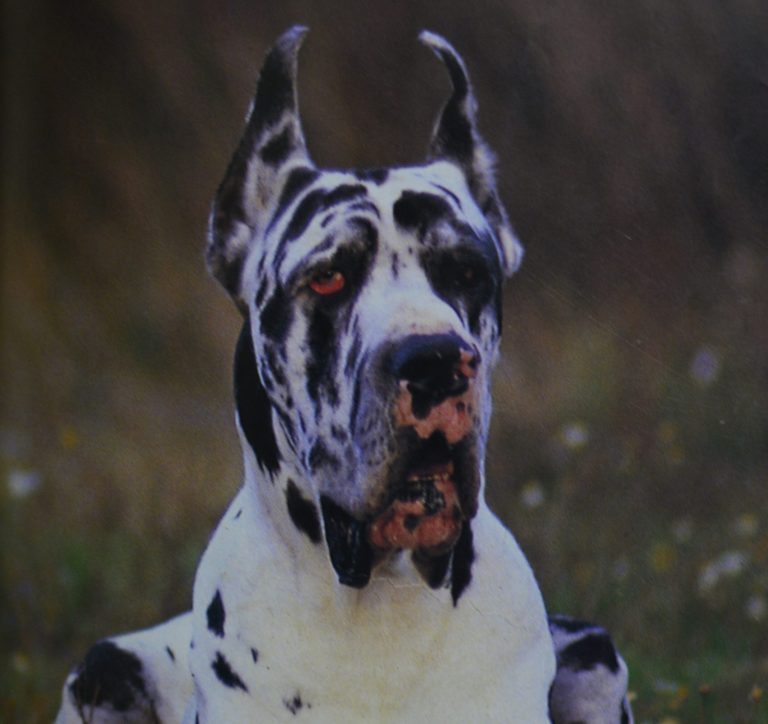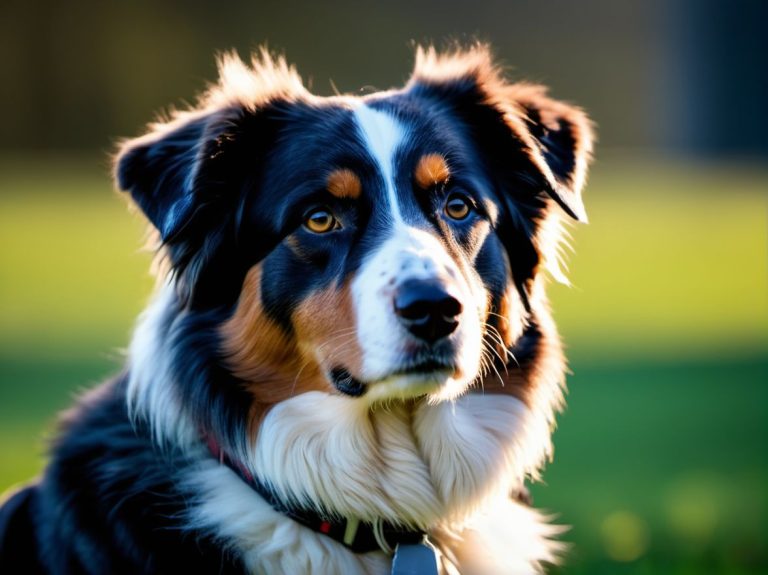GERMAN SHEPHERD: Intelligent Breed
Discover the versatile German shepherd breed renowned for intelligence, loyalty, and athleticism.

The German Shepherd, also known as the Alsatian in some countries, is a popular and versatile breed of dog. They are medium to large-sized dogs with a muscular build.
Their rich history is from humble beginnings as herding dogs in Germany to their widespread roles as police K-9s, service dogs, and cherished family companions.
Learn about their history, temperament, training needs, and health considerations.
History
The German Shepherd, or “Deutscher Schäferhund” in German, originated in Germany in the late 19th century. The breed’s development is largely credited to Captain Max von Stephanitz, a German cavalry officer and dog breeder.
German Shepherds quickly gained recognition for their exceptional working abilities and were employed in various roles, including herding, guarding, and military work. During World War I, they served as messenger dogs, Red Cross dogs, and sentries. Their intelligence and versatility made them invaluable assets on the battlefield.
After the war, German Shepherds gained popularity worldwide, thanks in part to their remarkable performance during the war. They were used in various working capacities, including police work, search and rescue, and as guide dogs for the visually impaired.
In the 20th century, the breed’s popularity continued to soar, and German Shepherds became one of the most beloved and recognizable dog breeds globally. Today, they are celebrated not only for their working prowess but also for their loyalty, intelligence, and versatility as family pets, service dogs, and working partners.
Personality
He is known for its intelligent, loyal, and versatile personality. They are highly trainable, making them excellent working dogs in roles such as police work, search and rescue, and service tasks. With proper socialization and training, they also make loving and protective family pets.
Their strong bond with their owners, combined with their natural instincts to protect, make them reliable companions and guardians. They are typically confident, courageous, and alert, making them well-suited for a variety of tasks and environments.

Physical Characteristics
Height
- Male 24-26 inches
- Female 22-24 inches
Weight
- Male 65-90 pounds
- Female 50-70 pounds
Coat
He has a dense double coat with a straight or slightly wavy outer coat and a thick undercoat.
Color
Certainly! German Shepherds can come in various colors, including:
- Black and tan
- Sable
- Solid black
- Solid white
Eyes
They typically have almond-shaped eyes that are dark brown in color.
Ears
He is known for its erect, triangular-shaped ears that stand alertly on top of its head.
Tail
The tail is long and bushy, reaching down to the hock joint, and typically hangs low when at rest, with a slight upward curve.
Life Span
The average life span is around 9-13 years.
Temperament
This watch dog is known for its loyal, intelligent, and confident temperament. They are typically courageous, alert, and eager to please, making them excellent working dogs and loyal family companions. With proper socialization and training, they can be gentle and affectionate with their families while also being vigilant protectors.
Grooming
They have a moderately high grooming requirement due to their double coat.
Regular brushing: They shed year-round, with heavier shedding during seasonal changes. Regular brushing, at least a few times a week, helps to remove loose fur and reduce shedding.
Bathing: They generally don’t require frequent baths unless they get dirty. Over-bathing can strip their coat of natural oils, so it’s best to bathe them only when necessary, using a dog-specific shampoo.
Nail trimming: Regular nail trimming is essential to prevent overgrowth and discomfort. Monthly nail trimming is typically sufficient.
Ear cleaning: Check their ears regularly for dirt, wax buildup, or signs of infection. Clean their ears as needed using a veterinarian-approved ear cleaning solution and cotton balls.
Dental care: Dental hygiene is important for their overall health. Brushing their teeth regularly and providing dental chews or toys can help prevent dental issues.

Training
Training this dog requires consistency, patience, and positive reinforcement techniques. Start with basic obedience commands like sit, stay, come, and heel. Use rewards such as treats, praise, and toys to motivate and reinforce good behavior. Socialization from an early age is crucial to ensure they are well-adjusted and comfortable around people and other animals.
Focus on building a strong bond with your guard dog through training sessions, regular exercise, and quality time together. Enroll in obedience classes or work with a professional trainer if needed to address specific behavioral issues or advanced training goals. Above all, remain firm yet gentle, providing clear guidance and leadership to help your German dog thrive as a well-behaved and happy companion.
Exercise
They are an active and energetic breed that requires plenty of exercise to stay healthy and happy. Daily physical activity is essential to prevent boredom and behavioral issues. Aim for at least 60-90 minutes of exercise per day, which can include:
Take your Shepherd for brisk walks or jogs to provide mental stimulation and burn off excess energy. Consider varying the route to keep things interesting.
Engage in interactive games such as fetch, tug-of-war, or agility activities to stimulate their mind and keep them physically active. Provide puzzle toys, obedience training sessions, or scent work activities to challenge their intellect and keep them mentally engaged.
Take your dog on hikes, visits to the dog park, or swimming outings to provide new experiences and outlets for their energy. Arrange playdates with other friendly dogs to promote socialization and provide additional exercise opportunities.
Nutrition
Proper nutrition is crucial for the health and well-being of your Shepherd. Choose a premium dog food that is specifically formulated for large breeds or for the nutritional needs of German Shepherds. Look for options that list meat as the first ingredient and avoid foods with fillers or artificial additives.
Ensure that its diet includes a balance of protein, carbohydrates, fats, vitamins, and minerals. Consult with your veterinarian to determine the appropriate portion sizes and feeding schedule based on factors such as age, weight, activity level, and any specific dietary requirements.
They are prone to obesity, which can lead to various health problems. Be mindful of portion sizes and avoid overfeeding treats or table scraps. Always provide your furry companion with access to clean, fresh water to keep them hydrated throughout the day.
Pay attention to any signs of food allergies or sensitivities, such as itching, digestive issues, or skin problems. If you suspect a food allergy, consult with your veterinarian to identify and address the issue.
Health Concerns
They are generally healthy dogs, but like all breeds, they can be prone to certain health issues. Some common health concerns associated with the breed:
Hip Dysplasia
This is a genetic condition where the hip joint doesn’t develop properly, leading to arthritis and mobility issues.
Elbow Dysplasia
Similar to hip dysplasia, elbow dysplasia is a condition where the elbow joint doesn’t form correctly, causing lameness and pain.
Degenerative Myelopathy
This is a progressive neurological disease that affects the spinal cord, leading to weakness and paralysis in the hind limbs.
Bloat (Gastric Dilatation-Volvulus)
This is a life-threatening condition where the stomach fills with gas and twists on itself, cutting off blood flow. Immediate veterinary attention is required.
Exocrine Pancreatic Insufficiency (EPI)
This is a condition where the pancreas doesn’t produce enough digestive enzymes, leading to malnutrition and weight loss.
Allergies
German Shepherds can be prone to skin allergies, food allergies, and environmental allergies.
Degenerative Joint Disease
This is a progressive condition where the cartilage in the joints deteriorates, leading to pain and mobility issues.
Panosteitis
Also known as “growing pains,” this condition causes inflammation in the long bones of young dogs, resulting in lameness and pain.
Bottom Line
German Shepherds are intelligent, loyal, and versatile dogs known for their strength and agility. They excel in various roles, including police work, search and rescue, and as beloved family pets. Proper training, socialization, and exercise are crucial to their well-being.
However, they are prone to certain health issues such as hip dysplasia, allergies, and bloat. With proper care and attention, German Shepherds make wonderful companions, demonstrating unwavering loyalty and devotion to their owners.
FAQs (Frequently Asked Questions)
Q. Are German Shepherds good with children?
Yes, they can be excellent family dogs when properly trained and socialized. They are often protective and gentle with children.
Q. Do they shed a lot?
Yes, they have a double coat and shed moderately year-round, with heavier shedding during seasonal changes.
Q. Are German Shepherds aggressive?
German Shepherds are not inherently aggressive but can exhibit protective instincts if not properly trained and socialized. Early socialization and training are essential to prevent aggression.
Q. Do German Shepherds get along with other pets?
They can get along well with other pets, especially when they are raised together from a young age. Proper introductions and socialization are key.
Q. Do German Shepherds require a lot of space?
While German Shepherds appreciate having space to move around, they can adapt to various living situations, including apartments, as long as they receive adequate exercise and mental stimulation.
Q. At what age do German Shepherds stop growing?
German Shepherds typically reach their full adult size by around 18 months to 2 years of age.
Q. Are German Shepherds good guard dogs?
Yes, German Shepherds are known for their protective instincts and make excellent guard dogs when properly trained and socialized.
Q. Do German Shepherds have a strong prey drive?
Yes, German Shepherds have a natural prey drive, which can vary in intensity between individuals. Proper training can help manage and control this instinct.
Q. Can German Shepherds live in hot climates?
While German Shepherds can adapt to various climates, they may struggle in extremely hot conditions due to their thick double coat. Providing shade and plenty of water is essential.
Q. Are German Shepherds prone to separation anxiety?
Like many breeds, German Shepherds can experience separation anxiety if left alone for long periods without proper training and mental stimulation.
Q. Are German Shepherds good for first-time dog owners?
German Shepherds can be suitable for first-time dog owners who are willing to dedicate time to training, socialization, and exercise. However, they require commitment and consistency.






